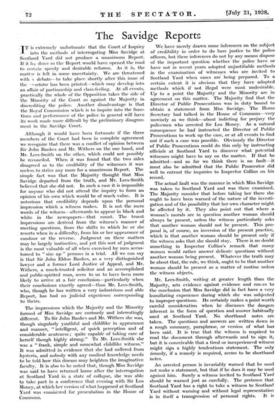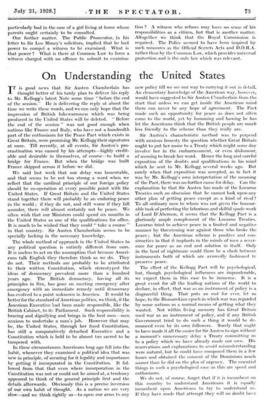The Savidge Reports
. IT is extremely unfortunate that the Court of. Inquiry into the methods of interrogating Miss Savidge at Scotland Yard did not produce a unanimous Report. If it ha' done so the Report would have opened the road to certain speedy and desirable reforms. As it is, the matt-r is left in some uncertainty. We are threatened with I debate—to take place shortly after this issue of the 'rectator has been printed—which may develop into an affair of partisanship and class-feeling. At all events, practically the whole of the Opposition takes the side of the Minority of the Court as against the Majority in discrediting the police. Another disadvantage is that the Royal Commission which is to inquire into the func- tions and performance of the police in general will have its work made more difficult by the preliminary disagree- ment in the Savidge Court.
Although it would have been fortunate if the three members of the Court had been in complete agreement we recognize that there was a conflict of opinion between Sir John Bankes and Mr. Withers on the one hand, and Mr. Lees-Smith on the other, which could not possibly be reconciled. When it was found that the two sides disagreed as to the credibility of the witnesses it was useless to strive any more for a unanimous Report. The simple fact was that the Majority thought that Miss Savidge departed from the truth, and Mr. Lees-Smith believed that she did not. In such a case it is impossible for anyone who did not attend the inquiry to form an opinion of his own which would be of much value. It is notorious that credibility depends upon the personal impression which a witness makes. It is not the mere words of the witness—afterwards to appear in black and white in the newspapers—that count. The truest impressions are derived from the witness's manner of meeting questions, from the shifts to which he or she resorts when in a difficulty, from his or her appearance of candour or the reverse. Judgment on these matters may be largely instinctive, and yet this sort of judgment is the most valuable of all when exercised by men accus- tomed to " size up " persons in a trial. All we can say is that Sir John Eldon Bankes, as a very distinguished lawyer and a former Lord Justice of Appeal, and Mr. Withers, a much-trusted solicitor and an accomplished and public-spirited man, seem to us to have been more likely to arrive at a fair conclusion—particularly when their conclusions exactly agreed—than Mr. Lees-Smith, who, though he has written a very industrious and able Report, has had no judicial experience corresponding to theirs.
The impressions which the Majority and the Minority formed of Miss Savidge are curiously and interestingly different. To Sir John Bankes and Mr. Withers she was, though singularly youthful and childlike in appearance and manner, " intelligent, of quick perception and of considerable acuteness ; quite capable of taking care of herself though highly strung." To Mr. Lees-Smith she was a " frank, simple and somewhat childlike witness." It was admitted in evidence that she had suffered from hysteria, and nobody with any medical knowledge needs to be told how this disease may heighten the imaginative faculty. It is also to be noted that, though Miss Savidge was said to have returned home after the interrogation at Scotland Yard in a state of collapse, she was able tp take part in a conference that evening with Sir Leo Money, at which her version of what happened at Scotland Yard was considered . for presentation in the House of Commons. We. have merely drawn some inferences on the subject of credibility in order to do bare justice to the police officers, but these inferences do not by any means dispose of the important question whether the police have or have not in recent years adopted unjustifiable methods in the examination of witnesses who are invited to Scotland Yard when cases are being prepared. To a certain extent it is obvious that they have adopted methods which if not illegal were most undesirable. Up to a point the Majority and the Minority are in agreement on this matter. The Majority find that the Director of Public Prosecutions was in duty bound to obtain a statement from Miss Savidge. The Home Secretary had talked in the House of Commons—very unwisely as we think—about indicting for perjury the policemen who arrested Sir Leo Money. As a natural consequence he had instructed the Director of Public Prosecutions to work up the case, or at all events to find out if such a case was possible. Obviously the Director of Public Prosecutions could do this only by instructing officials at Scotland Yard to discover what potential witnesses might have to say on the matter. If that be admitted—and so far we think there is no fault—it must also be admitted that the Public Prosecutor did well to entrust the inquiries to Inspector Collins on his record.
The actual fault was the manner in which Miss Savidge was taken to Scotland Yard and was there examined. The Majority consider that before taking her there she ought to have been warned of the nature of the investi- gation and of the possibility that her own character might be affected by it. They also point out that where a woman's morals are in question another woman should always be present, unless the witness particularly asks that another woman should not be present. This pro- posal is, of course, an inversion of the present practice, which is that another woman should be present only if the witness asks that she should stay. There is no doubt something in Inspector Collins's remark that many women would rather answer delicate questions without another woman being present. Whatever the truth may be about that, the rule, we think, ought to be that another woman should be present as a matter of routine unless the witness objects.
Mr. Lees-Smith, writing at greater length than the Majority, sets evidence against evidence and comes to the conclusion that Miss Savidge did in fact have a very humiliating experience during which she was subjected to improper questions. He certainly makes a point worth careful consideration when he discusses the dangers inherent in the form of question and answer habitually used at Scotland Yard. No shorthand notes are taken. The questions and answers are written down in a rough summary, paraphrase, or version of what has been said. It is true that the witness is required to read the document through afterwards and to sign it, but it is conceivable that a tired or inexperienced witness might sign a highly tendentious statement. The only remedy, if a remedy is required, seems to be shorthand notes.
An arrested person is invariably warned that he need not make a statement, but that if he does it may be used against him. Surely a witness invited to Scotland Yard should be warned just as carefully. The pretence that Scotland Yard has a right to take a witness to Scotland Yard without warning and without legal representation is in itself a transgression of personal rights. It is particularly bad in the case of a girl living at home whose parents ought certainly to be consulted. One further matter. The Public • Prosecutor, in his• letter to Sir Leo Money's solicitors, implied that he had power to compel a witness to be examined. What is that power ? What is there at Corrimon Law to force a witness charged with no offence to submit to examina- tion ? A witness who refuses may have no sense of his responsibilities as a citizen, but that is another matter. Altogether we think that the Royal Commission is required. The Police seemed to have been inspired by such measures as the Official Secrets Acts and D.O.R.A. rather than by the Common LaW, which provides universal protection and is the only law which was relevant.





















































 Previous page
Previous page